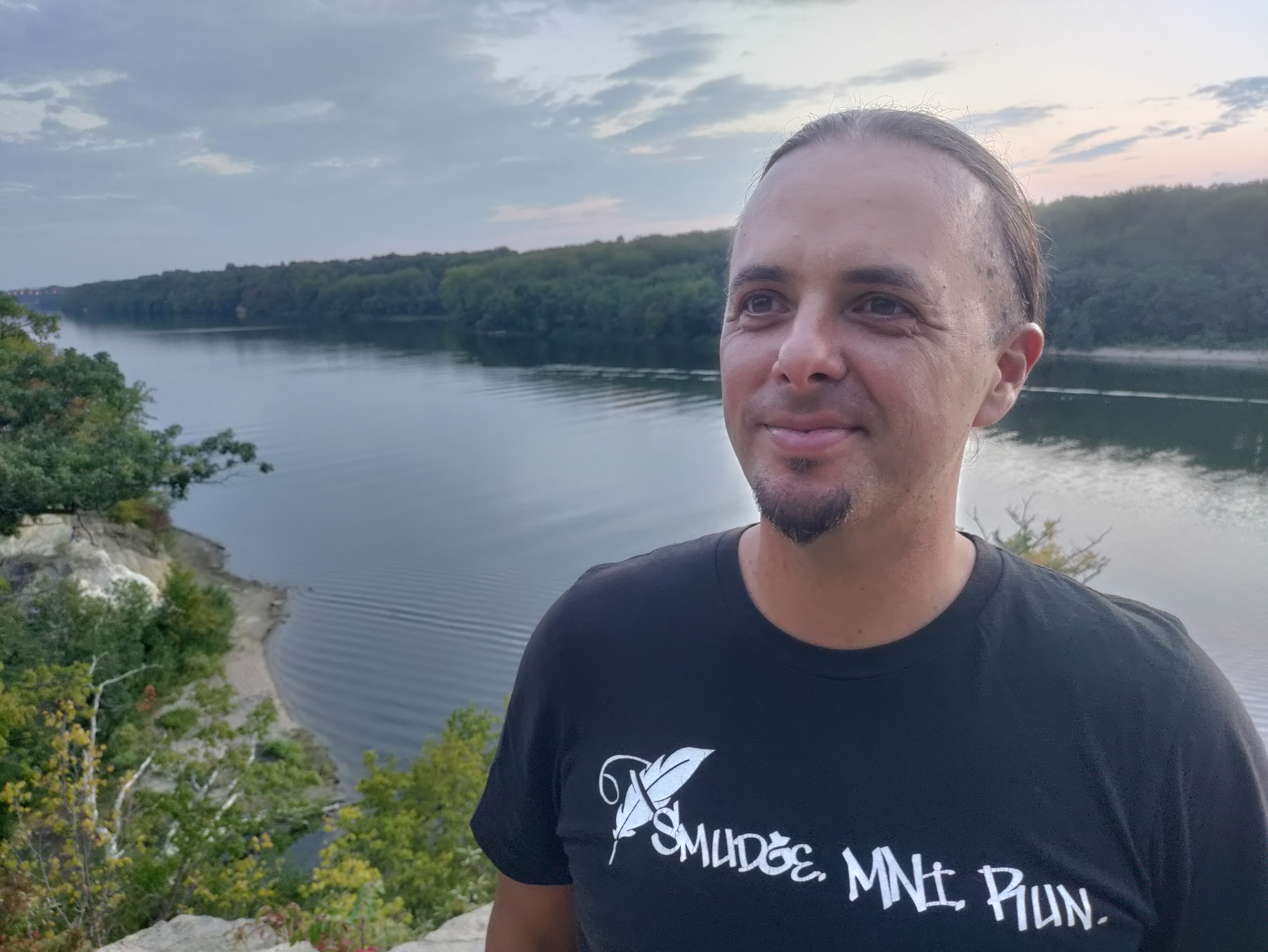Brett Ramey

Brett Ramey
Brett Ramey (Iowa Tribe of Kansas and Nebraska) works across areas of Indigenous land stewardship, land-based education, and participatory design processes. He serves as a Climate Resilience Planner for the Ioway Tribe, which includes leading an internship program and supporting land stewardship of Ioway Tribal National Park. This work informs his contributions in other areas of Indigenous conservation and food systems, including leading "Restorying Regenerative Agriculture," a participatory grantmaking program of the Regenerative Agriculture Foundation that supports Black, Indigenous, and other People of Color-led organizations in the food and farming space. Before returning to the Midwest in January 2020, he served as Director of the Doris Duke Conservation Scholars Program at the University of Washington from 2017-2019. He is based in Northeast Kansas and Minneapolis, Minnesota.
Ramey, B., 2024. This is Climate Resilience: Frontline Organizations Creating Climate Resilient Futures for Food Production, Regenerative Agriculture Foundation. https://regenerativeagriculturefoundation.org/this-is-climate-resilience/
Ramey, B., 2023. Náwo Wapánagun Hinmányiwi: Pathways to Climate Resilience. Iowa Tribe of Kansas and Nebraska. https://publuu.com/flip-book/199107/482028
Ramey, B., 2019. Reflections from the Field: DDSCP Design Manual, Doris Duke Conservation Scholars Program at the University of Washington. https://drive.google.com/file/d/1gf136qr25qzoEStnNHkxW_3_37DnaQoQ/view
Brett Ramey attended Haskell Indian Nations University, a public tribal land-grant university, and the University of Kansas in Lawrence, Kansas, for his undergraduate degree. Haskell was initially founded in 1884 as a residential boarding school for Native American Children but was later transformed into an intertribal university. The federal government used residential boarding schools to force assimilation. Haskell, Ramey says, “is now a place of Indigenous resurgence and reconnection” (2024). Also located near wetlands, attending Haskell helped rekindle his love for the landscape, learning about wildlife habitats, plant medicines, and, more importantly, “learning with the lands” (2024). At the same time, a proposed highway threatened to go right through them. From lived experience and acquired knowledge at Haskell, Ramey understood that the proposed project threatened the environment and culture. Such experience set the foundation for his work: at the intersection of environmental, social, and cultural issues, as they are always interwoven and connected.
Ramey previously served as the Director of the Doris Duke Conservation Scholars Program at the University of Washington. The program, funded by the Doris Duke Charitable Foundation, transforms conservation through professional development, research, internships, and community for young professionals underrepresented in the environmental field. He currently works with the Regenerative Agriculture Foundation as the Program Lead of the Restorying Regenerative Agriculture program and as a Climate Resilience Planner with his tribe, the Iowa Tribe of Kansas and Nebraska. As Program Lead of Restorying Regenerative Agriculture, he helps connect, support, and learn from Black, Indigenous, and People of Color while advancing environmental sustainability.
The highlight of Ramey's career has been working with others. From identifying partners for summer internships with the Doris Duke Conservation Scholars Program to now holding a position in which he can serve as a partner organization for youth development, he has been able to teach and learn alongside others. Though his work has taken him to various places across the country, he has "circled all the way back home," taking his acquired knowledge, relationships, and experience back home to his tribe in Kansas to help advance stewardship and climate resilience in the recently established Ioway Tribal National Park.
Though the term elicits various connotations, numerous influential figures have contributed to personal and professional growth throughout Ramey's career. Among them was a farmer whom Ramey went to help after seeing a job listing. The woman, a former urban-based organizer turned farmer to try out something new, taught Ramey about plant medicine, healing, and the beauty of methodical processes. She always used to tell people to "point your wheelbarrow the direction you're gonna move it before you fill it," which could be interpreted beyond the literal sense of the phrase, and to clean and put away your tools (2024) constantly. Though both pieces of advice were related to farming, they have served as lifelong advice, as relationships should be cared for in the same way we take care of tools at the end of a day in the field. Ramey also cites Dr. Daniel Wildcat as another influential figure in his life and one he seeks to emulate as a mentor.
In terms of mentoring others, Ramey tries to emulate the types of mentors to which he responds best. He always asks himself, "Who are the people that mentored me? And what was it about their style?" (2024). This reflection is an opportunity to pass learnings along to others, which they can then pass down when the time comes. Ramey seeks to be a mentor who brings forward intergenerational practices, ethics, and values, often drawing from those to whom he himself responds best. It is evident through his various leadership and educational positions that such an approach to mentorship rewards both the mentee and the mentor.
Aside from pointing your wheelbarrow in the direction you're going to go, Ramey reminds young professionals that any one thing is never just one thing. All people have something that makes them unique. He advises young professionals to explore their unique gifts and contributions to their communities and the world and identify how to stay on that path. He highlights that you should identify places that will value everything you bring to the table. This might look like finding organizations or funding sources that support your vision and purpose rather than curating your vision to places and things you apply for.
(JEDSI) Survey and interviews conducted by Justice, Equity, Diversity, and Sustainability Initiative staff. 2022-2024. Yale University-School of the Environment. New Haven, Connecticut.
Our leadership. Regenerative Agriculture Foundation. (n.d.). Retrieved February 12, 2024 from https://regenerativeagriculturefoundation.org/about/our-leadership/
Our leadership [Photo]. Regenerative Agriculture Foundation. (n.d.). Retrieved February 12, 2024 from https://regenerativeagriculturefoundation.org/about/our-leadership/
Restorying Regenerative Agriculture. Regenerative Agriculture Foundation. (n.d.). Retrieved February 12, 2024 from https://regenerativeagriculturefoundation.org/restorying-regenerative-ag...
Our leadership [Photo]. Regenerative Agriculture Foundation. (n.d.). Retrieved February 12, 2024 from https://regenerativeagriculturefoundation.org/about/our-leadership/